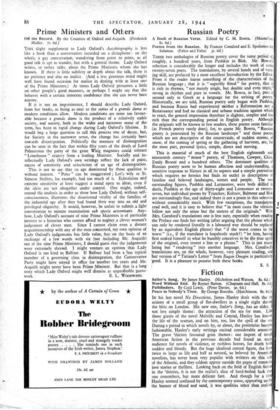Russian Poetry
THESE two anthologies of Russian poetry cover the same period of, roughly, a hundred years, from Pushkin to Blok. Mr. Bowra's selection is considerably the longer and includes the work of some twenty-seven poets. The translations, by several hands and of vary- ing skill, are prefaced by a most excellent Introduction by the Editor. From it the reader learns something of the characteristics of the Russian language ; that it is " superbly fitted " for poetry, that it is rich in rhymes, " not merely single, but double and even triple," strong in rhythm and pure in vowels. Mr. Bowra, in fact, puts it second only to Greek as a language for the writing of poetry. Historically, we are told, Russian poetry only began with Pushkin, and because Russia had experienced neither a Reformation nor a Renaissance and had no classical and urbane tradition against which to react, the general impression therefore is slighter, simpler and less rich than the corresponding period in English poetry. Although the originals will be known to few readers, these poems seem familiar (as French poetry rarely does), for, to quote Mr. Bowra, " Russian poetry is penetrated by the Russian landscape " and those poems which are not descriptive of the countryside, of sudden storms, of snow, of the coming of spring or the gathering of harvests, arc, for the most part, personal lyrics, simple, direct and moving.
This is material of much of the best English eighteenth and nineteenth century " minor " poetry, of Thomson, Cowper, Clare, Emily Brontë and a hundred others. The dominant qualities of Russian poetry seem to be human affection and understanding, a sensitive response to Nature in all its aspects and a simple patriotism which requires no heroics but finds its outlet in descriptions of familiar and beloved landscapes, scenes and people. The two outstanding figures, Pushkin and Lermontov, were both skilled in duels, Pushkin at the age of thirty-eight and Lermontov at twenty- seven, but individual poems by Tyutchev, Koltsov, Balmont and Blot are outstandingly fine, and indeed there is not a poem in this selection without considerably merit. With few exceptions, the translations read well, and it is easy to believe that " in most cases the versions follow not only the sense but the metres of the originals." With Mrs. Cornford's translations one is less sure, especially when reading the Preface one finds her writing (after arguing that the phrase which can only be rendered literally in a laboured way should be replaced by an equivalent English phrase) that " if the worst comes to the worst " (i.e., if the translator is hopelessly stuck?) " let him, having first soaked himself in what he humbly conceives to be the true spirit of the original, even invent a line or a phrase." This is dot trans- lating but " rendering " into another language. Mrs. Cornford's translations are, on the whole, however, very pleasant reading, and .her version of " Tatiana's Letter " from Eugen Onegin is particularly 'good. It is a pleasure to possess both these books.
A Book of Russian Verse. Edited by C. M. Bowra. (Maani!Ian. 8s. 6d.) Poems from the Russian. By Frances Cornford and E. Spolioncm sky Salaman. (Faber and Faber. 3s. 6d.) S. S.


























 Previous page
Previous page